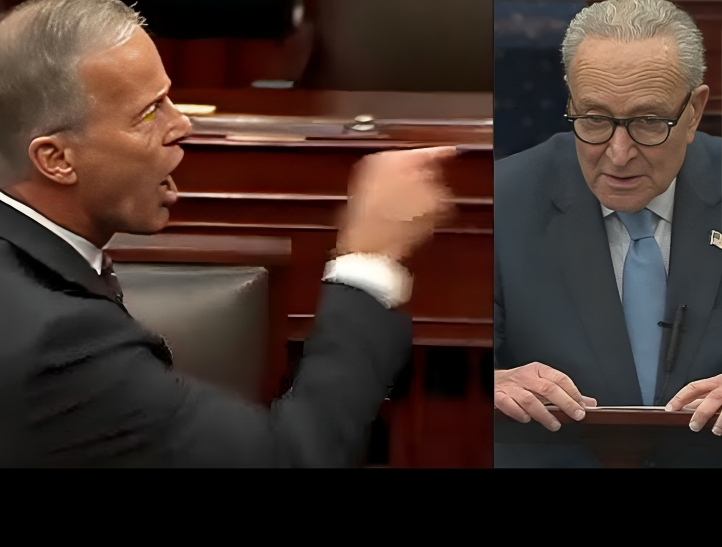Senate Majority Leader calls out Democrats amid mounting pressure to end government freeze
Senate Majority Leader John Thune (R-SD), long regarded for his steady and reserved demeanor, broke from his typically composed tone on Wednesday in a rare show of visible frustration. Speaking on the Senate floor, Thune accused Democratic leaders of prolonging the ongoing government shutdown and using critical social welfare programs as bargaining chips in a broader political standoff.
The tense moment marked a striking turn for Thune, who has built a reputation over two decades in Congress as a soft-spoken negotiator rather than a firebrand. But with the shutdown nearing its 30th day, and key programs facing imminent lapses in funding, even the Senate’s usually calm Republican leader appeared to have reached his limit.
A Heated Exchange Over Food Assistance
The confrontation unfolded during debate over legislation concerning the Supplemental Nutrition Assistance Program (SNAP) — the federal food aid program relied on by more than 40 million Americans.
Senate Democrats, led by Sen. Ben Ray Luján (D-NM), pressed for an emergency vote on a standalone measure to ensure SNAP benefits continue uninterrupted through the shutdown. Republicans objected, arguing that piecemeal bills would only extend the gridlock.
Thune responded sharply, his voice rising as he accused Democrats of blocking multiple attempts by Republicans to reopen the entire government.
“Let me just point out that we are 29 days into a Democrat shutdown,” Thune said from the Senate floor. “SNAP recipients shouldn’t go without food. People should be getting paid in this country. We’ve tried to do that 13 times — and you voted no 13 times.”
As Democrats pressed for an immediate vote, Thune turned toward their side of the chamber, visibly frustrated.
“You just figured out, 29 days in, that there might be consequences? That people could run out of money? Yeah — we’re 29 days in,” he said, striking the lectern. “At some point, the government runs out of money. You finally realize this thing has consequences.”
The exchange drew attention both for Thune’s emotional delivery and for what it revealed about the growing tension behind closed doors.
https://twitter.com/EricLDaugh/status/1983612233138495953
Mounting Frustration Inside the GOP
Republican senators have accused Democrats of deliberately extending the shutdown to gain leverage on unrelated spending priorities — particularly renewed healthcare subsidies under the Affordable Care Act.
Thune, echoing that view, insisted that Democrats were using SNAP and other social programs as pressure points to extract broader concessions.
“This isn’t a political game,” he said during his remarks. “These are real people’s lives we’re talking about.”
The South Dakota senator’s comments reflected a broader impatience within his party, as public pressure mounts on both chambers to reach an agreement.
While Democrats have framed the fight as a defense of working families and healthcare access, Republicans argue the majority party is “holding government hostage” for policy goals that should be debated separately from emergency funding.
Two Competing Paths Forward
The legislative standoff now revolves around two competing proposals.
Luján’s Democratic bill seeks to restore funding solely for SNAP, keeping benefits flowing to families even as other federal operations remain shuttered. Meanwhile, Sen. Josh Hawley (R-MO) introduced a Republican alternative that would also extend funding for both food aid and military pay during the shutdown.
Thune, however, has dismissed both standalone efforts as inadequate.
“We don’t need one-off fixes,” Thune told reporters after the floor exchange. “We need a clean, bipartisan bill to get people back to work and government functioning again.”
The White House has echoed that stance, with President Donald Trump emphasizing that the shutdown could end immediately if Democrats agree to a temporary funding resolution.
“You can call it the Schumer shutdown or the Democrats’ shutdown,” Trump said during a Rose Garden event earlier this week. “They’re doing the wrong thing, and the public knows it.”
Democrats Hold Their Line
For their part, Democratic leaders have insisted they will not support a continuing resolution that lacks long-term provisions for healthcare subsidies and child tax credits.
Senate Minority Leader Chuck Schumer (D-NY) defended his caucus’s position, saying Republicans are prioritizing short-term funding patches over sustainable solutions. Democrats argue that the GOP’s approach would simply postpone another crisis until next year.
Privately, several Democrats have acknowledged growing unease as key programs like SNAP and WIC (Women, Infants, and Children) approach funding cliffs. But they also point to polling suggesting that the public blames both parties equally, softening the political risk of standing firm.
Behind the Scenes: Talks Resume
Despite the tense rhetoric, Thune hinted that negotiations are slowly resuming. He told reporters that bipartisan discussions had “ticked up significantly” in recent days and that dialogue with key Democrats had been “constructive.”
When asked if he planned to step in personally, Thune replied, “It will happen pretty soon.”
Several senators from both parties have expressed cautious optimism that a framework could emerge before federal benefits lapse in November. Still, there are no formal talks scheduled, and lawmakers continue to trade blame for the stalemate.
A Senator Known for Composure Loses Patience
Thune’s visible frustration carried weight precisely because of his reputation for restraint. The 64-year-old South Dakotan, often seen as a bridge between the party’s traditional conservatives and newer populist members, rarely raises his voice in public settings.
After the session, he acknowledged his unusually fiery tone but defended the outburst.
“Sorry, I channeled a little bit of anger there,” Thune told reporters. “But it’s a high level of frustration. They realize this is a losing argument. They’re trying to buy time — and every day they delay makes things worse.”
Observers noted that his comments underscored a sense of fatigue that has settled over Capitol Hill as the shutdown drags into its fifth week.
Impact of the Prolonged Shutdown
The current government freeze has furloughed hundreds of thousands of federal workers and suspended pay for millions more.
Programs like food assistance and housing vouchers are running on borrowed funds, while agencies have begun preparing contingency plans for more severe service interruptions if Congress fails to act soon.
The Department of Agriculture recently warned that SNAP benefits could lapse within weeks, leaving millions of families without critical food aid. The agency also confirmed that emergency reserves — roughly $5 billion — are reserved for natural disasters and cannot legally be diverted to cover shutdown expenses.
Economists estimate that the shutdown’s ripple effects could soon reach $10 billion in lost economic activity, adding pressure to both parties to reach an agreement.
Looking Ahead
Though the immediate political blame remains divided, analysts say the path forward likely depends on leadership concessions from both sides.
A bipartisan group of senators has quietly begun drafting a short-term framework that could reopen the government through early 2026 while deferring larger fights over healthcare and tax policy.
Whether Thune’s floor eruption will shift momentum remains uncertain. For now, it stands as a rare emotional moment in a chamber known for its restraint — and a reminder of how high the stakes have become as the shutdown enters its second month.

Sarah Mitchell is a bestselling novelist recognized for her insightful and emotionally resonant stories that explore the complexities of human relationships. Originally from Denver, Colorado, Sarah grew up in a family of teachers who nurtured her curiosity and love for storytelling. She studied psychology at Stanford University, where she became fascinated by the intricacies of human behavior—an interest that would later shape her writing career. Sarah’s novels are praised for their nuanced characters, intricate plots, and ability to capture the subtle tensions that define love, friendship, and family ties. Her breakthrough novel, The Spaces Between Us, became an instant bestseller, lauded for its honest portrayal of strained family relationships and the fragile bonds that hold people together. Since then, she has published several works that continue to captivate audiences around the world. Outside of her writing career, Sarah is passionate about mental health advocacy and often partners with organizations to promote awareness and support for those struggling with emotional well-being. Her personal life is quieter—she enjoys hiking in the Colorado mountains, practicing yoga, and spending time with close friends. With each new book, Sarah Mitchell cements her reputation as a writer who illuminates the beauty and struggles of human connection.









